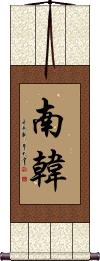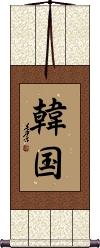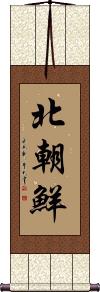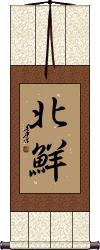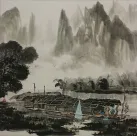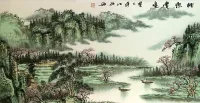Many custom options...
And formats...

South Korea in Chinese / Japanese...
Buy a South Korea calligraphy wall scroll here!
Personalize your custom “South Korea” project by clicking the button next to your favorite “South Korea” title below...
South Korea
南韓 is the common Chinese name for the country of South Korea.
The official English name being Republic of Korea.
See Also: North Korea | Asia
South Korea
North Korea
北朝鮮 is the Chinese and Japanese name for the country of North Korea.
The official English name being Democratic People's Republic of Korea.
See Also: Asia
North Korea
This short Japanese name for the country of North Korea (Democratic People's Republic of Korea).
There is a 3-character name, 北朝鮮 that is a lot more common.
See Also: Asia
This in-stock artwork might be what you are looking for, and ships right away...
Gallery Price: $63.00
Your Price: $34.88
South China River Boat
Landscape Painting
Discounted Blemished
Gallery Price: $27.00
Your Price: $15.00
Gallery Price: $55.00
Your Price: $19.88
Gallery Price: $400.00
Your Price: $138.88
Gallery Price: $65.00
Your Price: $35.88
Not the results for south korea that you were looking for?
Below are some entries from our dictionary that may match your south korea search...
| Characters If shown, 2nd row is Simp. Chinese |
Pronunciation Romanization |
Simple Dictionary Definition |
光明 see styles |
guāng míng guang1 ming2 kuang ming koumyou(p); koumei / komyo(p); kome こうみょう(P); こうめい |
More info & calligraphy: Light / Bright and Promising Future(1) bright light; (2) hope; bright future; (3) {Buddh} light emanating from a buddha or bodhisattva, symbolizing their wisdom and compassion; (place-name) Gwangmyeong (South Korea) v. last entry. |
南韓 南韩 see styles |
nán hán nan2 han2 nan han |
More info & calligraphy: South Korea |
韓国 see styles |
kankoku かんこく |
More info & calligraphy: South Korea |
韓國 韩国 see styles |
hán guó han2 guo2 han kuo kankoku かんこく |
More info & calligraphy: South Korea(personal name) Kankoku |
ソウル see styles |
souru / soru ソウル |
More info & calligraphy: Soule |
韓 韩 see styles |
hán han2 han kan かん |
Han, one of the Seven Hero States of the Warring States 戰國七雄|战国七雄; Korea from the fall of the Joseon dynasty in 1897; Korea, esp. South Korea 大韓民國|大韩民国; surname Han (1) (abbreviation) (See 大韓民国) Republic of Korea; South Korea; (2) (hist) Han (ancient Chinese state); (surname) Han |
K国 see styles |
keikoku / kekoku ケイこく |
(net-sl) (derogatory term) South Korea |
世宗 see styles |
shì zōng shi4 zong1 shih tsung sejon セジョン |
Sejong the Great or Sejong Daewang (1397-1450), reigned 1418-1450 as fourth king of Joseon or Chosun dynasty, in whose reign the hangeul alphabet was invented (place-name) Sejong City (South Korea) |
中韓 中韩 see styles |
zhōng hán zhong1 han2 chung han chuukan / chukan ちゅうかん |
China-South Korea China and South Korea |
九里 see styles |
jiǔ lǐ jiu3 li3 chiu li kuri クリ |
Liuli district of Xuzhou city 徐州市[Xu2 zhou1 shi4], Jiangsu (place-name) Guri (South Korea) |
亀尾 see styles |
kumi クミ |
(place-name) Gumi (South Korea) |
井邑 see styles |
chonupu チョンウプ |
(place-name) Jeongeup (South Korea) |
仁川 see styles |
rén chuān ren2 chuan1 jen ch`uan jen chuan inchon インチョン |
Incheon Metropolitan City in Gyeonggi Province 京畿道[Jing1 ji1 dao4], South Korea Incheon (South Korea); Inchon; (place-name) Incheon (South Korea); Inchon; Yingcheng |
保寧 see styles |
poryon ポリョン |
(place-name) Boryeong (South Korea) |
光州 see styles |
guāng zhōu guang1 zhou1 kuang chou kuwanju クワンジュ |
Guangzhou, old name for Huangchuan 潢川[Huang2 chuan1] in Xinyang 信陽|信阳, Henan; Gwangju Metropolitan City, capital of South Jeolla Province 全羅南道|全罗南道[Quan2 luo2 nan2 dao4], South Korea (place-name) Gwangju (South Korea); Kwangju |
光陽 see styles |
kanyan クァンヤン |
(place-name) Gwangyang (South Korea) |
全州 see styles |
quán zhōu quan2 zhou1 ch`üan chou chüan chou chonju チョンジュ |
see 全州縣|全州县[Quan2 zhou1 Xian4] (noun - becomes adjective with の) (1) whole state; (2) all states; every state; (place-name) Jeonju (South Korea) |
公州 see styles |
konju コンジュ |
(place-name) Gongju (South Korea); Kongju |
利川 see styles |
lì chuān li4 chuan1 li ch`uan li chuan ichon イチョン |
see 利川市[Li4 chuan1 Shi4] (place-name) Icheon (South Korea) |
北韓 北韩 see styles |
běi hán bei3 han2 pei han bukkan ブッカン |
(Tw, HK) North Korea (name used in South Korea, Taiwan, Hong Kong and Macao) (See 北朝鮮) North Korea; (place-name) North Korea (name used in South Korea) |
南北 see styles |
nán běi nan2 bei3 nan pei minamikita みなみきた |
north and south; north to south (1) north and south; north to south; (2) (abbreviation) South Korea and North Korea; (surname) Minamikita north and south |
南原 see styles |
namon ナモン |
(place-name) Namwon (South Korea) |
南鮮 see styles |
nansen なんせん |
(colloquialism) South Korea; (place-name) South Korea |
原州 see styles |
yuán zhōu yuan2 zhou1 yüan chou wonju ウォンジュ |
Yuanzhou district of Guyuan city 固原市[Gu4 yuan2 shi4], Ningxia (place-name) Wonju (South Korea) |
咸鏡 咸镜 see styles |
xián jìng xian2 jing4 hsien ching |
Hamgyeongdo Province of Joseon Korea, now divided into North Hamgyeong Province 咸鏡北道|咸镜北道[Xian2 jing4 bei3 dao4] and South Hamgyeong Province 咸鏡南道|咸镜南道[Xian2 jing4 nan2 dao4] of North Korea |
唐津 see styles |
tanjin タンジン |
(place-name) Dangjin (South Korea) |
在韓 see styles |
zaikan ざいかん |
(adj-f,vs) resident in South Korea; situated in South Korea |
地藏 see styles |
dì zàng di4 zang4 ti tsang jizou / jizo じぞう |
Kṣitigarbha, the Bodhisattva of the Great Vow (to save all souls before accepting Bodhi); also translated Earth Treasury, Earth Womb, or Earth Store Bodhisattva (surname) Jizou Ti-tsang, J. Jizō, Kṣitigarbha, 乞叉底蘗沙; Earth-store, Earth-treasury, or Earthwomb. One of the group of eight Dhvani- Bodhisattvas. With hints of a feminine origin, he is now the guardian of the earth. Though associated with Yama as overlord, and with the dead and the hells, his role is that of saviour. Depicted with the alarum staff with its six rings, he is accredited with power over the hells and is devoted to the saving of all creatures between the nirvana of Śākyamuni and the advent of Maitreya the fifth century he has been especially considered as the deliverer from the hells. His central place in China is at Chiu-hua-shan, forty li south-west of Ch'ing-yang in Anhui. In Japan he is also the protector of travellers by land and his image accordingly appears on the roads; bereaved parents put stones by his images to seek his aid in relieving the labours of their dead in the task of piling stones on the banks of the Buddhist Styx; he also helps women in labour. He is described as holding a place between the gods and men on the one hand and the hells on the other for saving all in distress; some say he is an incarnation of Yama. At dawn he sits immobile on the earth 地 and meditates on the myriads of its beings 藏. When represented as a monk, it may be through the influence of a Korean monk who is considered to be his incarnation, and who came to China in 653 and died in 728 at the age of 99 after residing at Chiu-hua-shan for seventy-five years: his body, not decaying, is said to have been gilded over and became an object of worship. Many have confused 眞羅 part of Korea with 暹羅 Siam. There are other developments of Ti-tsang, such as the 六地藏 Six Ti-tsang, i. e. severally converting or transforming those in the hells, pretas, animals, asuras, men, and the devas; these six Ti-tsang have different images and symbols. Ti-tsang has also six messengers 六使者: Yama for transforming those in hell; the pearl-holder for pretas; the strong one or animals; the devīof mercy for asuras; the devī of the treasure for human beings; one who has charge of the heavens for the devas. There is also the 延命地藏 Yanming Ti-tsang, who controls length of days and who is approached, as also may be P'u-hsien, for that Purpose; his two assistants are the Supervisors of good and evil 掌善 and 掌惡. Under another form, as 勝軍地藏 Ti-tsang is chiefly associated with the esoteric cult. The benefits derived from his worship are many, some say ten, others say twenty-eight. His vows are contained in the 地藏菩薩本願經. There is also the 大乘大集地藏十電經 tr. by Xuanzang in 10 juan in the seventh century, which probably influenced the spread of the Ti-tsang cult. |
坡州 see styles |
paju パジュ |
(place-name) Paju (South Korea) |
城南 see styles |
sonnamu ソンナム |
(place-name) Seongnam (South Korea) |
Click here for more south korea results from our dictionary
The following table may be helpful for those studying Chinese or Japanese...
| Title | Characters | Romaji (Romanized Japanese) | Various forms of Romanized Chinese | |
| South Korea | 南韓 南韩 | nán hán / nan2 han2 / nan han / nanhan | ||
| South Korea | 韓國 韓国 | kan koku / kankoku | ||
| North Korea | 北朝鮮 北朝鲜 | kita chousen kitachousen kita chosen | běi cháo xiǎn bei3 chao2 xian3 bei chao xian beichaoxian | pei ch`ao hsien peichaohsien pei chao hsien |
| North Korea | 北鮮 | hokusen / hokusen | ||
| In some entries above you will see that characters have different versions above and below a line. In these cases, the characters above the line are Traditional Chinese, while the ones below are Simplified Chinese. | ||||
Successful Chinese Character and Japanese Kanji calligraphy searches within the last few hours...
